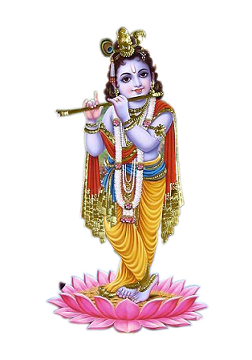Lord Krishna : God of Compassion, Tenderness and Love
Krishna is a major deity in Hinduism. He is worshipped as the eighth avatar of the God Vishnu and also as the supreme God in his own right.He is the god of compassion, tenderness, and love in Hinduism and is one of the most popular and widely revered among Indian divinities. Krishna’s birthday is celebrated every year by Hindus on Janmashtami according to the lunisolar Hindu calendar, which falls in late August or early September of the Gregorian calendar.
As an incarnation of the Hindu god Vishnu, Lord Krishna is one of the faith’s most revered divinities. The story of how the Hindu god of love and compassion was born is one woven through many of Hinduism’s most sacred texts, and it inspires faithful throughout India and beyond.
BACKGROUND AND HISTORY
References to Lord Krishna can be found in several important Hindu texts, most notably the epic poem the Mahabharata.
Krishna is typically depicted as having blue, blue-black or black skin, holding his bansuri (flute) and sometimes accompanied by a cow or a female cowherd. One of the most widely revered of the Hindu deities, Krishna is known by many other names, among them Govinda, Mukunda, Madhusudhana, and Vasudeva. He may also be depicted as an infant or child engaging in playful pranks, such as stealing butter.
SYNOPSIS OF KRISHNA’S BIRTH
Mother Earth, unable to bear the burden of sins committed by evil kings and rulers, appeals to Brahma the Creator for help.
Kamsa, the ruler of Mathura (in northern India) is one such tyrant, inspiring fear among all the rules. On the day Kamsa’s sister Devaki is married to Vasudeva, a voice from the sky prophesies that Devaki’s eighth son will destroy Kamsa.
Lord Vishnu appears before them, telling them he will return to earth in the guise of their son and rescue them from Kamsa’s tyranny. When the divine baby is born, Vasudeva finds himself magically freed from prison, and he flees with the infant to a safe house. Along the way, Vishnu removes obstacles like snakes and floods from Vasudeva’s path.
Vasudeva gives the infant Krishna to a family of cowherds, exchanging him for a newborn girl. Vasudeva returns to the prison with the girl. When Kamsa learns of the birth, he rushes to the prison to kill the child. But when he arrives, the infant ascends to the heavens and is transformed into the goddess Yogamaya. She tells Kamsa, “O foolish! What will you get by killing me? Your nemesis is already born somewhere else.”
Meanwhile, Krishna is raised as a cowherd, leading an idyllic childhood. As he matures, he becomes a skillful musician, wooing the women of his village with his flute-playing. Eventually, he returns to Mathura, where he slays Kamsa and his henchmen, restores his father to power and becomes friendly with many of Hinduism’s heroes, including the warrior Arjuna.
PRIMARY THEME
As one of the principal gods of Hinduism, Krishna represents mankind’s aspiration to embody all that is divine. Amorous and loyal, he is seen as the ideal husband, and his playful nature is a gentle admonition to remain good-natured in the face of life’s challenges.
As counsel to the warrior Arjuna, Krishna serves as a moral compass the faithful. His exploits in the Bhagavad Gita and other holy scripture are ethical models of behavior for Hindus, particularly on the nature of personal choice and responsibility to others.
IMPACT ON POPULAR CULTURE
As the god of love, compassion, music, and dance, Krishna has been closely associated with the arts in Hindu culture since its beginnings. The story of Krishna’s birth and childhood, called Ras and Leela, are a staple of classical Indian drama, and many of India’s classical dances pay homage to him.
Krishna’s birthday, called Janmashtami, is one of Hinduism’s most popular holidays and is celebrated throughout the Hindu world. It takes place in August or September, depending on when the date falls on the Hindu lunisolar calendar. During the festival, the faithful engage in prayer, song, fasting, and feasting to honour Krishna’s birth.
In the West, followers of Lord Krishna are often associated with the International Society for Krishna Consciousness. Formed in New York City in the mid-1960s, it soon became known as the Hare Krishna movement, and its chanting followers could often be seen in parks and other public spaces.


[…] Lord Krishna (the divine statesman) is the eighth avatar of Vishnu and is one of the most widely revered deities in Hinduism. He was a cowherd (sometimes depicted as a charioteer or statesman) who shrewdly changes rules. […]
[…] next day of Sankranti Lord Krishna is also worshipped. According to legends famous in south India, Lord Krishna lifted Govardhan on the next day of Makar […]